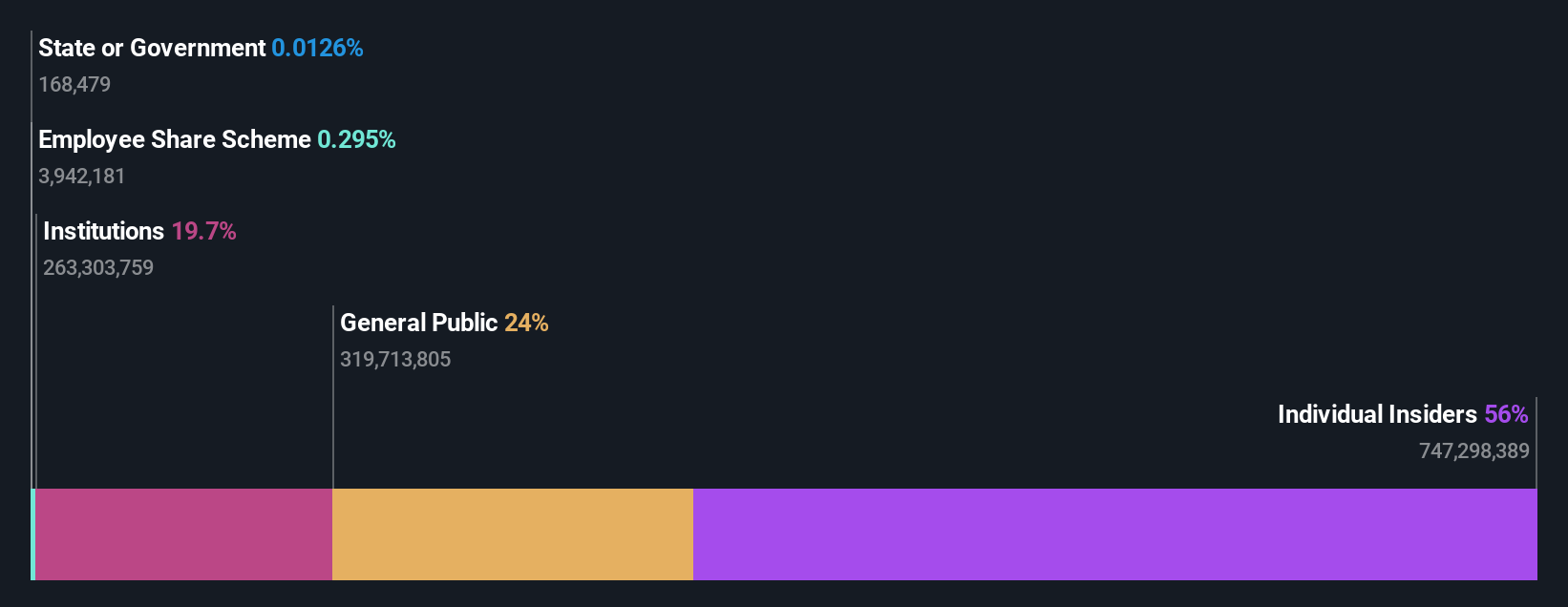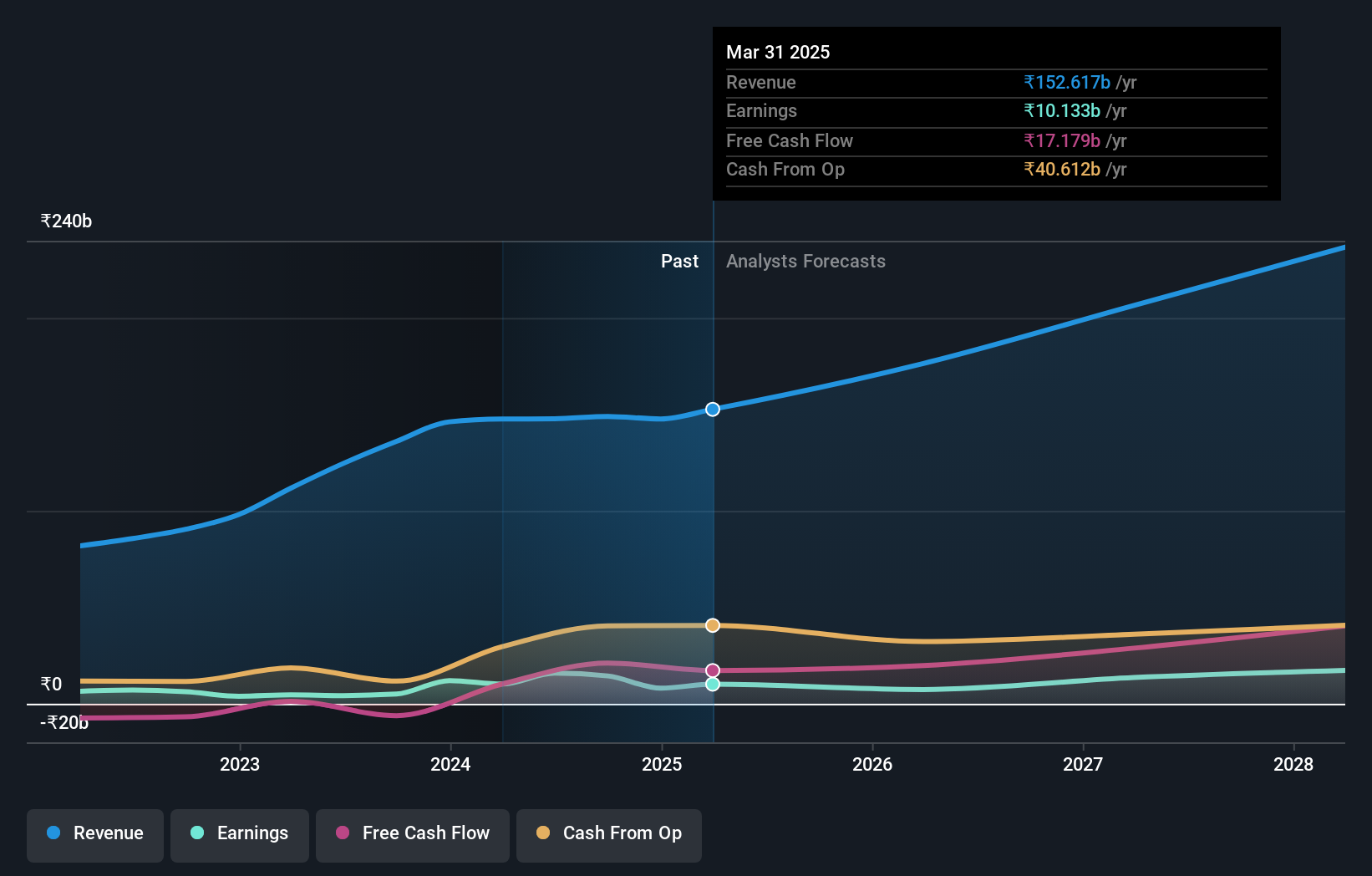With 56% ownership, Biocon Limited (NSE:BIOCON) insiders have a lot riding on the company's future

Key Insights
- Biocon's significant insider ownership suggests inherent interests in company's expansion
- The top 2 shareholders own 54% of the company
- Institutional ownership in Biocon is 20%
If you want to know who really controls Biocon Limited (NSE:BIOCON), then you'll have to look at the makeup of its share registry. We can see that individual insiders own the lion's share in the company with 56% ownership. Put another way, the group faces the maximum upside potential (or downside risk).
With such a notable stake in the company, insiders would be highly incentivised to make value accretive decisions.
Let's delve deeper into each type of owner of Biocon, beginning with the chart below.
View our latest analysis for Biocon

What Does The Institutional Ownership Tell Us About Biocon?
Institutional investors commonly compare their own returns to the returns of a commonly followed index. So they generally do consider buying larger companies that are included in the relevant benchmark index.
As you can see, institutional investors have a fair amount of stake in Biocon. This suggests some credibility amongst professional investors. But we can't rely on that fact alone since institutions make bad investments sometimes, just like everyone does. It is not uncommon to see a big share price drop if two large institutional investors try to sell out of a stock at the same time. So it is worth checking the past earnings trajectory of Biocon, (below). Of course, keep in mind that there are other factors to consider, too.

Biocon is not owned by hedge funds. Because actions speak louder than words, we consider it a good sign when insiders own a significant stake in a company. In Biocon's case, its Top Key Executive, Kiran Mazumdar-Shaw, is the largest shareholder, holding 36% of shares outstanding. For context, the second largest shareholder holds about 18% of the shares outstanding, followed by an ownership of 4.8% by the third-largest shareholder.
After doing some more digging, we found that the top 2 shareholders collectively control more than half of the company's shares, implying that they have considerable power to influence the company's decisions.
While studying institutional ownership for a company can add value to your research, it is also a good practice to research analyst recommendations to get a deeper understand of a stock's expected performance. There are plenty of analysts covering the stock, so it might be worth seeing what they are forecasting, too.
Insider Ownership Of Biocon
The definition of an insider can differ slightly between different countries, but members of the board of directors always count. Company management run the business, but the CEO will answer to the board, even if he or she is a member of it.
Most consider insider ownership a positive because it can indicate the board is well aligned with other shareholders. However, on some occasions too much power is concentrated within this group.
It seems that insiders own more than half the Biocon Limited stock. This gives them a lot of power. Given it has a market cap of ₹499b, that means insiders have a whopping ₹280b worth of shares in their own names. Most would be pleased to see the board is investing alongside them. You may wish to discover if they have been buying or selling.
General Public Ownership
With a 24% ownership, the general public, mostly comprising of individual investors, have some degree of sway over Biocon. This size of ownership, while considerable, may not be enough to change company policy if the decision is not in sync with other large shareholders.
Next Steps:
I find it very interesting to look at who exactly owns a company. But to truly gain insight, we need to consider other information, too. Case in point: We've spotted 2 warning signs for Biocon you should be aware of, and 1 of them is a bit concerning.
But ultimately it is the future, not the past, that will determine how well the owners of this business will do. Therefore we think it advisable to take a look at this free report showing whether analysts are predicting a brighter future.
NB: Figures in this article are calculated using data from the last twelve months, which refer to the 12-month period ending on the last date of the month the financial statement is dated. This may not be consistent with full year annual report figures.
Valuation is complex, but we're here to simplify it.
Discover if Biocon might be undervalued or overvalued with our detailed analysis, featuring fair value estimates, potential risks, dividends, insider trades, and its financial condition.
Access Free AnalysisHave feedback on this article? Concerned about the content? Get in touch with us directly. Alternatively, email editorial-team (at) simplywallst.com.
This article by Simply Wall St is general in nature. We provide commentary based on historical data and analyst forecasts only using an unbiased methodology and our articles are not intended to be financial advice. It does not constitute a recommendation to buy or sell any stock, and does not take account of your objectives, or your financial situation. We aim to bring you long-term focused analysis driven by fundamental data. Note that our analysis may not factor in the latest price-sensitive company announcements or qualitative material. Simply Wall St has no position in any stocks mentioned.
About NSEI:BIOCON
Biocon
Engages in the manufacture and sale of biotechnology products and research services in India, Brazil, Singapore, and internationally.
Reasonable growth potential and slightly overvalued.
Similar Companies
Market Insights
Community Narratives



